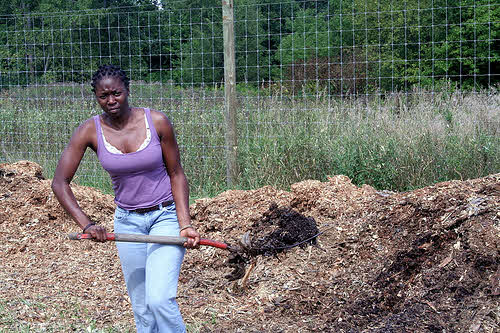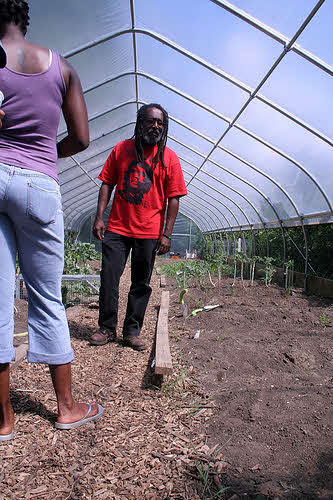A fast-growing movement is African-Americans reclaiming their connection to their urban land and their food, as part of food justice and food sovereignty movements. People’s Grocery and Mo’ Better Food in Oakland, Growing Power, Rooted in Community, Detroit Black community Food Security Network, and many others are organizing with farmers and connecting African-American growers and consumers. Many of these, such as the Detroit Black Community Food Security Network, are working for communities of color to have democratic control over their own food systems. Their work includes youth programs and urban gardening in areas where access to healthy, affordable food is limited, as is the case in many low-income and people of color neighborhoods.
These groups are also raising awareness of the ways that African-American communities, and communities of color in general, have been sidelined within the food movement itself. Inclusion and participation of people of color has come slowly and late. Often, African-American neighborhoods are targeted as ‘intervention’ areas by outside organizations that – though well-meaning – are neither led by nor accountable to the community and its most urgent needs and goals. The prevailing white culture of the food movement as a whole creates barriers: the typical image of farmers presented often reflects a white archetype and the types of food solutions presented are not always culturally relevant or practical.
A critical element of many African-American groups’ work thus involves nation-wide education and organizing on structural racism as it impacts health, farming, food, and land. Among other elements, these organizations are committed to knocking down barriers to food production and food access. Some have joined the world-wide movement for food sovereignty, in their own communities and through the U.S. Food Sovereignty Alliance, so that citizen control over food and agriculture can exist across global economic systems.
Ultimately, we all eat, and we are all implicated. Achieving racial justice in the food system is not the sole burden of African-Americans organizing but will take multiracial alliances of people raising awareness of systemic disparities, and working together to end them.
For more information on organizing to end racism in the food system:
- Check out Why Hunger’s webpage on race and the food system, which explains how race manifests within the food system, and offers resources to make your organization more accountable (www.whyhunger.org/portfolio?topicId=24#).
- Sign up for the Growing Food and Justice listserv, which will update you on news and actions related to justice and access in the food system (www.growingfoodandjustice.org).
- See the websites of Detroit Black Community Food Security Network, Growing Power, The Black/Land Project, Association of Farmworker Opportunity Programs, Coalition of Immokalee Workers, Student/Farmworker Alliance, Student Action with Farmworkers, Grassroots International, People’s Grocery, Rooted in Community, Federation of Southern Cooperatives, and Solid Ground.
1. Hooks, Bell. Sisters of the Yam: Black Women and Self-Recovery, Cambridge: South End Press, 1993
Download the Harvesting Justice pdf here, and find action items, resources, and a popular education curriculum on the Harvesting Justice website.
Read more from Other Worlds here, and follow us on Facebook and Twitter!
Copyleft Other Worlds. You may reprint this article in whole or in part. Please credit any text or original research you use to Tory Field and Beverly Bell, Other Worlds.
Image credit: Live Real via photopin cc


